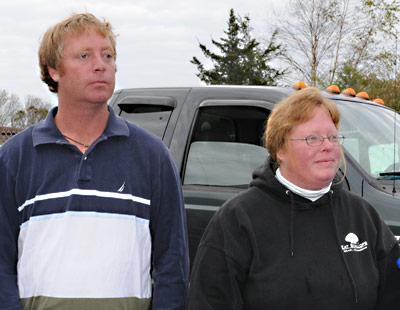Lesters Found Not Guilty

After an hour of testimony and cross-examination in a non-jury trial on Oct. 26, East Hampton Town Justice Lisa R. Rana dismissed all charges against an Amagansett brother and sister who make their living on the bay. The State Department of Environmental Conservation had cited Kelly and Paul Lester this summer with violating fishing and fish-selling regulations, but Ms. Rana ruled it failed to prove its case.
Richard Massio, a D.E.C. enforcement officer, had issued two summonses to Mr. Lester on July 8, one for fluke in excess of the daily trip limit, the other for fluke in a carton without a tag bearing the information required. On the same day, Ms. Lester was charged with operating a roadside stand where shellfish were offered for sale without a proper permit. They pleaded not guilty on Aug. 18.
On the steps of East Hampton Town Justice Court before the non-jury trial, Daniel G. Rodgers of Riverhead, the defendants’ attorney, accused the D.E.C. of abusing its power. Although he did not use the Dongan Patent, the 326-year-old royal decree that guaranteed East Hampton settlers the right to fish “without lett or hindrance,” before the bench, Mr. Rodgers told a group of his clients’ supporters that it was “still as valid and active today as it always was.”
“This is not about gold coast bankers, it’s about baymen who fish from small wooden boats with nets. It’s about a way of life that will not be regulated out of existence. It’s been 20 years, almost to the day, that Calvin Lester was regulated out of business. So, today we stand and fight.”
Mr. Rodgers was referring to Calvin Lester, his defendants’ late father. Using ocean seines to catch striped bass, Mr. Lester’s stock and trade, had been outlawed by the D.E.C. in 1991.
Karen Seidler, the prosecutor, laid out the state’s case, questioning Officer Massio. He testified that he was on patrol when he spotted Ms. Kelly’s coolers and a for sale sign in front of a house on Abraham’s Path, East Hampton. He knocked on the front door and, when no one responded, he said, “I went around to the back door and saw . . .1 gentleman cutting flat fish.” Neither Kelly nor Paul Lester was there at the time.
When he got closer, he said he noticed the fish cartons, and was told by Louis Arceri, the fish cutter, that the fish were Mr. Lester’s. Each box contained 70 pounds of fluke, properly tagged and to be sent to Gosman’s in Montauk, together adding up to the 140 pounds then allowed per day. However, he said, two other boxes, which were not tagged, were found to contain fluke, as did a basket from which Mr. Arceri was taking fish to cut.
Officer Massio confiscated the fish from the untagged box and the basket, took them to Stuart’s Fish Market in Amagansett, as allowed by law, and sold them for $202.75. He testified that Mr. Lester showed up at Stuart’s during the transaction. Officer Massio told him confiscating the fish was necessary as “evidence.” He said Mr. Lester reported that his sister was not home because she had gone to find the tags for the confiscated fish, 50 pounds of fluke, which had been caught by another member of the family, James Lester.
During cross examination, Mr. Rodgers claimed that Officer Massio’s search of the fish boxes was illegal. The officer admitted that nothing on the outside of the boxes indicated there were fluke inside, which might have justified the search. In addition, he said, the required vessel trip report on hand was not a “completed document” because it had not been signed.
Officer Massio further testified that he had not actually seen Mr. Lester with the confiscated fish, nor Ms. Lester sell any shellfish. He defended the charge against her, however, saying an offer to sell was the same under state law as a sale. In answer to another question during cross-examination, the officer said he had surmised the coolers containing oysters and clams for sale were Ms. Lester’s because he assumed they were in front of her house. Mr. Rodgers informed him that the house was owned by Diane Lester, Kelly’s mother.
Stuart Vorpahl, a commercial fisherman and former East Hampton Town Trustee, was called as a witness to support Mr. Rodgers’s contention that the regulation requiring trap fishermen to land their catches already boxed and tagged was unrealistic.
After his successful defense, Mr. Rodgers said the D.E.C.’s enforcement division was the only agency he knew that routinely acted as police, prosecutor, and judge. He also told the Lesters’ jubilant supporters that Ms. Lester had state and town shellfishing permits, and that she operated a scallop-shucking shed that was inspected by the Suffolk Health Department.
“This was not about health and safety. It was about money — fines in the many thousands of dollars.” Mr. Rodgers said the D.E.C. tried to help balance its budget with a saltwater fishing license, but had failed. “So now they’re balancing the budget on the backs of people who fish from the beach in little wooden boats.”
He added that in confiscating the basket of fluke, Officer Massio had actually taken the fish Ms. Lester had planned to cook for dinner. “We are sending them a bill.”
